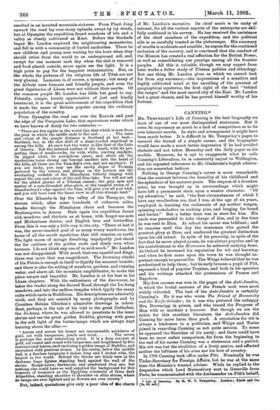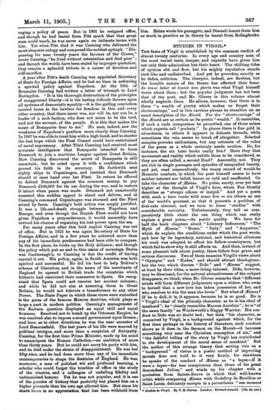MR. TEMPERLEY'S Life of Canning is the best biography we
have of one of our most distinguished statesmen. But it owes its supremacy as much to a lack of competitors as to its own inherent merits. In style and arrangement it might have been much better. It is difficult in Mr. Temperley's pages to unravel the thread of a simple career, and the biographer would have made a much better impression if he had avoided rhetoric and not taken Macaulay and the daily paper as his models. Moreover, he is apt to exaggerate what he calls Canning's Liberalism, he is constantly unjust to Wellington, and his repeated references to Mr. Gladstone's boyish admira- tion are somewhat tedious.
Nothing in George Canning's career is more remarkable
than the contrast between the humility of his childhood and the splendour of his maturer years. The stepson of a drunken actor, he was brought up in surroundings which might have left a permanent stain upon a weaker character. " Of my education," he said, "the first circumstances of which I have any recollection are, that I was, at the age of six years, employed in learning the rudiments of my mother tongue, spinning cockchafers on corking pins, and longing for bread and butter." But a better time was in store for him. His uncle was persuaded to take charge of him, and in due time he was sent to Eton. At school his career was brilliant ; and be remains until this day the statesman who gained the greatest glory at Eton, and conferred the greatest distinction upon his old school. In spite of his precocity, in spite of the fact that he never played games, he was always popular, and by his contributions to the Microcosm he achieved undying fame. At Oxford he increased his reputation for wit and learning, and when he first came upon the town he was thought im- portant enough to quarrel for. The Whigs believed that he was predestined to help them ; but he early became a pupil of Pitt, espoused a kind of popular Toryism, and both in his speeches and his writings attacked the pretensions of France and Napoleon.
His first success was won in the pages of the Anti-Jacobin, in which the brutal excesses of the French mob were most wittily ridiculed. The best of the Anti-Jacobin is certainly Canning's. He it was who wrote The Friend of Humanity and the Knife-Grinder ; he it was who pictured the unhappy Mrs. Brownrigg in prison, and who traced the Progress of Man with so mordant a humour. But though we are the richer for this excellent literature, the Anti-Jacobin did Canning far more harm than good. A reputation for wit is always a hindrance to a politician, and Whigs and Tories joined in regarding Canning as not quite serious. To some he appeared the Sheridan of his party ; and there could have been no more unfair comparison, for from the beginning to the end of his career Canning was a statesman and a patriot. His wit was but the ebullition of a lively genius, and affected neither the loftiness of his aims nor his love of country.
In 1796 Canning took office under Pitt. Nominally he was 17nder-Secretary for Foreign Affairs, but he was at the same time the Minister's trusted adviser. While be replied to the despatches which Lord Malmesbury sent to Grenville from Paris, he communicated with the Ambassador on Pitt's behalf, [7a.• Life cif Calsaiay. By H. W. V. Temperley. Loudon g Finch and co.
urging a policy of peace. But in 1801 he resigned office, and though he had learnt from Pitt much that that great man could teach, he was never again on intimate terms with him. Yet when Pitt died it was Canning who delivered the most eloquent eulogy and composed the noblest epitaph. " Dis- pensing for near twenty years the favours of the Crown," wrote Canning, "he lived without ostentation and died poor"; and though the words have been staled by improper quotation, they remain a splendid tribute to a career of devotion and self-sacrifice.
A year after Pitt's death Canning was appointed Secretary of State for Foreign Affairs, and he lost no time in enforcing a spirited policy against Napoleon. At the 18th of Brumaire Canning had written a letter of triumph to Lord Boringdon. " It is the thorough destruction of the principles of exaggerated liberty—it is the lasting ridicule thrown upon all systems of democratic equality—it is the galling conviction carried home to the bawlers for freedom in this and every other country, that there never was, nor will be, nor can be, a leader of a mob faction, who does not mean to be the lord, and not the servant, of the people. It is this that makes the name of Bonaparte dear to me." No man, indeed, saw the weakness of Napoleon's position more clearly than Canning. In 1807 he was able to treat him with a high hand, and to shatter the last hope which the First Consul could have entertained of naval supremacy. After Tilsit Canning had received most accurate intelligence that Bonaparte intended to force Denmark to join a maritime League against Great Britain. How Canning discovered the secret of Bonaparte is still uncertain ; but he acted upon it with a confidence which proved his faith in its accuracy. He forthwith sent eighty ships to Copenhagen, and insisted that Denmark should at once hand over her Fleet. In return he offered to defend Denmark against the common enemy, to pay Denmark £100,000 for its use during the war, and to restore it intact when peace was made. Denmark not unnaturally resented this sudden appeal to stand and deliver, and at Canning's command Copenhagen was stormed and the Fleet seized by force. Canning's bold action was amply justified. It was a life-and-death struggle between Napoleon and Europe, and even though the Danish Fleet would not have given Napoleon a preponderance, it would assuredly have revived his chance of regaining his lost power upon the sea.
For many years after this bold exploit Canning was out of office. But in 1822 he was again Secretary of State for Foreign Affairs, and in a few years he achieved more than any of his immediate predecessors had been able to compass. In the first place, be broke up the Holy Alliance; and though the policy which put an end to this union of sovereign States was Castlereagh's, to Canning is due the credit of having carried it out. His policy, again, in South America was both spirited and successful. He did his best to help Bolivar's scheme of liberation, and in the name of the merchants of England he opened to British trade the countries which. hitherto had restricted their commerce to Spain. He recog- nised that Spain could not recover her ancient colonies ; and while he did not aim at annexing them to Great Britain, he would not tolerate a transference to any other Power. The State Paper in which these views were embodied is the germ of the famous Monroe doctrine, which plays so large a part in modern politics. Canning's management of the Eastern question displayed an equal skill and equal firmness. Resolved not to break up the Ottoman Empire, he was resolved also to impose a sound government upon Greece ; and here, as in other directions, he was the near ancestor of Lord Beaconsfield. The last years of his life were marred by political intrigue, and more than a suspicion of disloyalty. Canning, for the first time Prime Minister, made up his mind to emancipate the Roman Catholics,—an ambition of more than thirty years. But he could not carry his party with him, and he died under the strain of disappointment. He was but fifty-nine, and he had done more than any of his immediate contemporaries to shape the destinies of England. He was, moreover, a man of polished wit and profound learning, a scholar who could forget the troubles of office in the study of the classics, and a colleague of unfailing fidelity and unblemished honour. Yet he was not popular, and it is one of the puzzles of history that posterity has placed bim on a higher pinnacle than his own age allowed him. But since his death there is no appreciation that has been withheld from
him. Heine wrote his panegyric, and Disraeli learnt from him as much in practice as in theory he learnt from Bolingbroke.











































 Previous page
Previous page